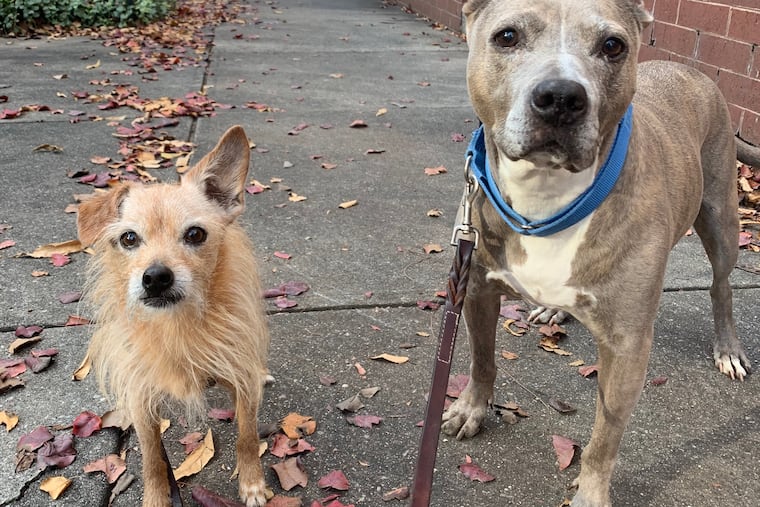The ‘pandemic pups’ adoption trend has a troubling side | Opinion
Rushing to adopt a dog during the pandemic might not be the responsible choice.

Our region has seen a dramatic rise in dog ownership during the pandemic. What we’ve seen less of is consideration of the long-term, potentially problematic side of this trend.
As a certified professional dog trainer based in Center City, I’ve witnessed firsthand the mutual benefits these new companionships have provided dogs and humans. But the downside is that many of these relationships built on temporary circumstances and desperation for distraction will fall apart when the circumstances change. Neglect of this reality, including in the irresponsible framing of a December cover story from Philadelphia magazine, succeeds in glorifying the most worrisome aspects of the so-called “pandemic puppy” boom.
» READ MORE: Pandemic demand challenges Pennsylvania’s dog industry and oversight
Breathless coverage of pandemic dog adoptions fixates on simply using our pets as distractions and vehicles through which we can find new ways to busy ourselves in a difficult time. Philadelphia Magazine’s story even cites a social media account as exemplifying the benefits of dogs as “content” — particularly alarming during a time when people are prone to getting sucked into debilitating periods of screen time while their dog lays bored at their feet.
This story reflects a perplexing myth: that you just have to give dogs the bare minimum to receive an unfailingly loyal and happy companion in return. This is not responsible pet ownership, and meeting basic needs is not all it takes to be successful. Acting like keeping the dog alive and giving it a pat on the head every once in a while will earn you unconditional love is harmful and misleading and results in unhappy dogs and people. This mindset will cause human-animal relationships to fail.
Downplaying the commitment of adoption threatens to contribute to a serious problem at the end of this pandemic, when many who impulsively adopted during COVID may regret their decision. Beyond that, it’s dangerous for anyone to suggest right now that rescues and shelters are empty because everyone wants a dog.
The Philly Mag piece quotes Philadelphia Animal Welfare Society executive director Melissa Levy saying that, for the first time ever, “PAWS has more people interested in adopting and fostering dogs than it has actual dogs.” The number of dogs in a private shelter like PAWS speaks only to the speed at which it pulls, not the overall population of homeless pets in Philadelphia. In reality, open-intake shelters like ACCT Philly—which differ from PAWS in being required by municipal contract to admit all found or surrendered pets — are far from underpopulated as they work hard to navigate new protocols and budget cuts. ACCT Philly is essentially “the pound,” where any and all animals in need have to be admitted, whereas PAWS is a privately funded rescue with the ability to choose which animals enter.
Another big problem with the emotionally driven acquisition of pets is that it leads to people rushing through the process. When people are desperate to bring a pup home ASAP, they often find the fastest and easiest option is an online dealer. There are intentionally misleading websites selling puppies from puppy mills and backyard breeders, which mass-produce puppies so they always have some readily available to anyone with funds. Lancaster is a notorious hub for this racket, and many irresponsibly bred puppies will fall victim to health and temperament problems.
Prospective dog owners need to make serious decisions and plans, like how to set aside finances for dog walkers or daycare and time in their own schedules to make sure these new friends don’t get left alone, understimulated, and forgotten once life starts returning to normal. I cannot emphasize enough the importance of making training plans to get ahead of struggles with separation anxiety or hindered socialization that many dogs will experience once their owners are no longer home all day, and guests begin to come knocking on doors once again.
» READ MORE: How my dog helped me overcome my fear of flying | Opinion
Dogs bring connection, but they are not simply a lubricant to help us find new ways to socialize with other people outdoors, or as a mere substitute for the human contact many of us are missing right now. They are the connection, the new friend. Changing our pace to watch and understand them, try to see the world how they do, and maybe take their cue that getting some fresh air, having a romp, and a good game of fetch can bring new appreciation for so many things outside the activities we relied on pre-COVID.
Dogs are indeed helping us through this pandemic. So let’s truly appreciate, learn from, and do right by them.
Marisa Scully has been a certified professional dog trainer in Philadelphia for 15 years and is based in Center City. She has previously contributed to the Guardian. www.phillydogtraining.com